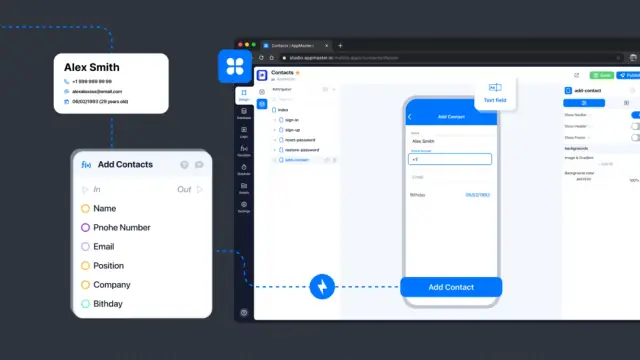Democratization of Software Development
Explore the concept of software development democratization, its opportunities and challenges.

What is the Democratization of Software Development?
The democratization of software development is a concept born out of the increasing need to make software development more accessible and inclusive to individuals with diverse backgrounds and skill sets. It aims to break down barriers that often prevent non-programmers from participating in the creation of applications and solutions.
The core idea behind this movement is to empower as many individuals as possible to contribute to the software development process. This is achieved by providing tools, technologies, and resources that simplify the development process and allow non-programmers to create, customize, and deploy software solutions without needing in-depth technical knowledge or expertise.
Low-code and no-code platforms are the most significant drivers of this democratization process, allowing users to design, build, and maintain applications through intuitive visual interfaces, rather than writing code manually. This significantly reduces the barriers to entry and makes it possible for individuals who might have otherwise been excluded from software development to participate in this growing and dynamic field.
Opportunities Created by Democratization
The democratization of software development paves the way for numerous opportunities in both technical and non-technical sectors. Here are some of the most notable benefits that the democratization movement brings:
Innovation
More innovative ideas and solutions are likely to emerge with a wider range of people participating in the software development process. This influx of fresh perspectives and creativity can lead to the development of new software applications that cater to previously unmet needs or provide better solutions to existing problems.
Untapped Potential
Many individuals who lack formal programming skills might possess valuable domain knowledge or unique insights that could be leveraged to create impactful software solutions. Democratization opens up the development process to these skilled individuals, allowing them to contribute their expertise and drive better results.
Collaboration
Democratization encourages interdisciplinary collaboration, as non-programmers can work alongside developers to create software solutions. This can lead to more effective team dynamics, clearer communication, and the prospect for greater success in meeting project goals.
Productivity
When individuals are empowered with the tools and resources to create their own software applications, they can work more efficiently and productively. This is particularly relevant in business settings, where software solutions can be tailored to the specific needs and processes of the organization, driving efficiencies as a result.
Cost Savings
By enabling non-programmers to participate in the software development process, there is potential for cost savings in various ways. For instance, smaller projects no longer require dedicated development teams, and resource allocation can be optimized based on the project's needs.

Challenges of Democratization in Software Development
Despite the numerous opportunities created by the democratization of software development, several challenges must be addressed to ensure its success. It's essential to understand and mitigate these challenges to make the most out of this revolutionary movement:
- Quality and Maintainability: Non-programmers might produce software that isn't as polished or maintainable as that created by professional developers. This can lead to long-term issues, including technical debt and potential difficulties in updating or scaling the application. Ensuring a balance between ease of use and quality output is vital for the success of democratization.
- Resistance from Traditional Developers: Some professional developers may feel threatened by the democratization movement, fearing that their jobs or skill sets may become obsolete or devalued. Education and communication are key in raising awareness of democratization's benefits to all stakeholders and fostering a culture of collaboration and inclusivity.
- Security Risks: With more individuals having access to sensitive information and systems, there is an inherent risk that data security may be compromised. Organizations must develop strong policies and practices to safeguard their data and systems, and educate users on the importance of adhering to these guidelines.
- Resource Management: Democratizing software development can lead to a scenario in which countless small-scale applications are created, potentially becoming difficult to manage. Developing strategies to efficiently allocate resources, track progress, and manage software solutions becomes increasingly important in this context.
No-Code Platforms and the Democratization Movement
The advent of no-code and low-code platforms has propelled the democratization of software development. These platforms have played a significant role in making software development accessible to a broader audience by reducing the barriers to entry and empowering non-programmers to create applications faster, and more cost-efficiently.
No-code platforms are designed to enable users with little or no programming experience to build, customize, and deploy applications through a visual interface, eliminating the need for writing code. With drag-and-drop functionality and pre-built components, these platforms facilitate the quick and easy development of applications, making it possible for non-programmers to bring their ideas to life.
On the other hand, low-code platforms still require some degree of coding knowledge but simplify the development process so that new and existing developers can more easily create applications. These platforms typically provide visual tools for building user interfaces, modeling database structures, and automating business processes.
One of the main reasons for the popularity of no-code and low-code platforms is their ability to save time and resources in software development. By providing a more rapid way to create applications, these platforms help organizations accelerate innovation, cater to changing business needs, and reduce the need for highly skilled developers.
In addition to the time and cost savings, no-code and low-code platforms foster a more collaborative environment by facilitating participation from various stakeholders, including business analysts, subject matter experts, and even end-users. This collaboration leads to better communication between all parties and ensures that the final product is better suited to the needs of its users.
AppMaster.io: A Catalyst in the Democratization Process
AppMaster.io is a leading no-code platform for creating backend, web, and mobile applications. By allowing users to visually create data models, business logic, REST API, and WebSocket endpoints without writing a single line of code, AppMaster.io plays a significant role in democratizing software development.
The versatility of AppMaster.io enables users with diverse development requirements to create a wide range of applications, from simple tools to complex enterprise solutions. The platform offers a comprehensive integrated development environment (IDE) designed to streamline application development and eliminate technical debt. It regenerates applications from scratch whenever requirements are modified, ensuring that even citizen developers can create scalable and maintainable software solutions. Compatibilities with multiple databases and application types make AppMaster.io a flexible choice for businesses of all sizes, from startups to enterprises.

Moreover, AppMaster.io ensures top-notch scalability and maintainability by generating real applications instead of just prototypes. Every time a user changes the blueprints, the platform generates a new set of applications within 30 seconds, minimizing the possibility of technical debt. When it comes to deployment, AppMaster.io offers several options, from hosting in the cloud to providing executable binary files and even source code for on-premises hosting. This flexibility allows users to deploy their applications according to their business requirements and preferences.
Key Takeaways
- The democratization of software development refers to the process of making software development more accessible to a wider audience, including non-programmers, through the use of low-code and no-code platforms, simpler APIs, and more intuitive interfaces.
- No-code platforms, like AppMaster.io, empower users with little or no programming experience to build, customize, and deploy applications through visual tools, substantially lowering the barrier to entry and promoting the creation of software solutions.
- These platforms accelerate innovation, cater to changing business needs, reduce the need for highly skilled developers, and foster a more collaborative environment among stakeholders.
- AppMaster.io is a powerful no-code platform that enables users to visually create backend, web, and mobile applications, thus playing a significant role in the democratization of software development.
- By generating real applications, offering deployment options, and minimizing technical debt, AppMaster.io ensures that users can create scalable and maintainable software solutions that cater to a wide range of business needs.
By embracing the no-code movement and leveraging platforms like AppMaster.io, businesses and individuals can unlock the immense potential that lies within democratizing software development. As software development becomes more accessible and efficient, organizations can expect to see increased productivity, innovation, and success.
FAQ
The democratization of software development refers to the process of making software development more accessible to a wider audience, including non-programmers, through the use of low-code and no-code platforms, simpler APIs, and more intuitive interfaces.
No-code platforms, like AppMaster.io, contribute to democratization by allowing users with little or no programming experience to build, customize, and deploy applications through visual tools, without the need for writing code. This greatly lowers the barrier to entry and empowers more people to create software solutions.
Some challenges of democratization include potential issues with quality, maintainability, and scalability of software produced by non-programmers, traditional developers' resistance to change, and security risks related to increased accessibility to sensitive information.
Democratization can create numerous opportunities, such as increasing innovation, unlocking untapped potential, facilitating collaboration among various stakeholders, boosting productivity, and reducing software development costs.
AppMaster.io is a powerful no-code platform that enables users to create backend, web, and mobile applications visually, without writing code. This empowers non-programmers to develop software solutions quickly and cost-effectively, thus promoting democratization of software development.
Yes, some low-code and no-code platforms, including AppMaster.io, are designed for scalability and can support the development of enterprise and high-load applications, by generating efficient source code and offering various deployment options.





